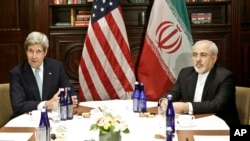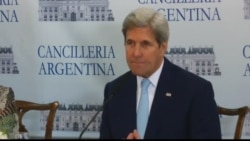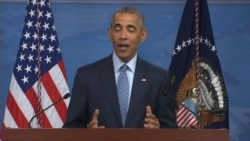Republicans are sharply criticizing the Obama administration over Thursday's revelation that the United States used a cash payment of $400 million to Iran as leverage to ensure the release of a group of American prisoners being held by Tehran.
House Speaker Paul Ryan released a statement saying President Barack Obama and his administration "have been misleading us since January" and the president owes the American people a "full accounting of his actions and the dangerous precedent he has set."
Republican presidential nominee Donald Trump called Obama a "liar" for early denying that the payment was ransom.
The chairman of the House Foreign Affairs Committee, Republican Ed Royce, said the payment "put more American lives at risk. And we've emboldened Iran. We've encouraged them, frankly, to take more hostages."
WATCH: Secretary of State Kerry - US does not pay ransom
State Department denies ransom payment
The State Department has repeatedly denied the payment was a ransom. U.S. policy forbids the government from paying ransoms in order to avoid encouraging the kidnapping of American citizens. Instead, the Obama administration has said that the negotiations to return the Iranian money – the result of an aborted arms deal in the 1970s with the U.S.-backed shah – were conducted separately from the talks to free four U.S. citizens in Iran.
"We had concerns that Iran may renege on the prisoner release,'' State Department spokesman John Kirby told reporters, citing years of mutual mistrust between the two countries. "Obviously when you're inside that 24-hour period and you already now have concerns about the endgame in terms of getting your Americans out, it would have been foolish and prudent, irresponsible, for us not to try to maintain maximum leverage."
The prisoners were: Washington Post Tehran bureau chief Jason Rezaian; Marine veteran Amir Hekmati; Christian pastor Saeed Abedin; and Nosratollah Khosravi-Roodsari, whose disappearance had not been publicly known before he was freed.
The cash transfer and the hostages' release – both on January 17 – came at the same time as Iran's deal with the United States and five other world powers restraining Tehran's development of nuclear weapons, along with the lifting of sanctions that had hobbled Iran's economy.
Iranian media reports have quoted senior Iranian defense officials as saying they considered the cash as a ransom payment.
WATCH: President Obama on why US paid cash
Cash transfer
On the day of the transfer, non-U.S. currency cash — in euros and Swiss francs among others — was stacked on wooden pallets and flown into Iran on an unmarked cargo plane.
It was the first installment on a $1.7 billion settlement stemming from the failed U.S. weapons pact with Iran in 1979 just before its last monarch, Shah Mohammed Reza Pahlavi, was toppled. The U.S. dispatched the cash in foreign currencies because any transaction with Iran in dollars is illegal under U.S. law.








